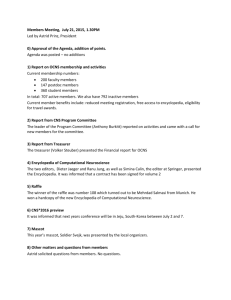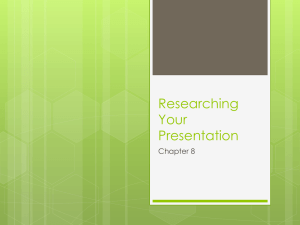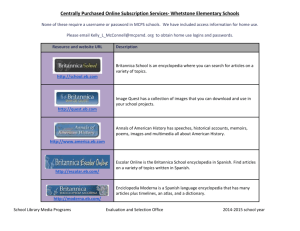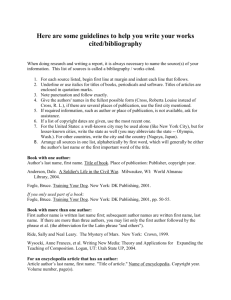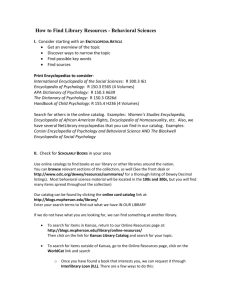assignments - WordPress.com
advertisement
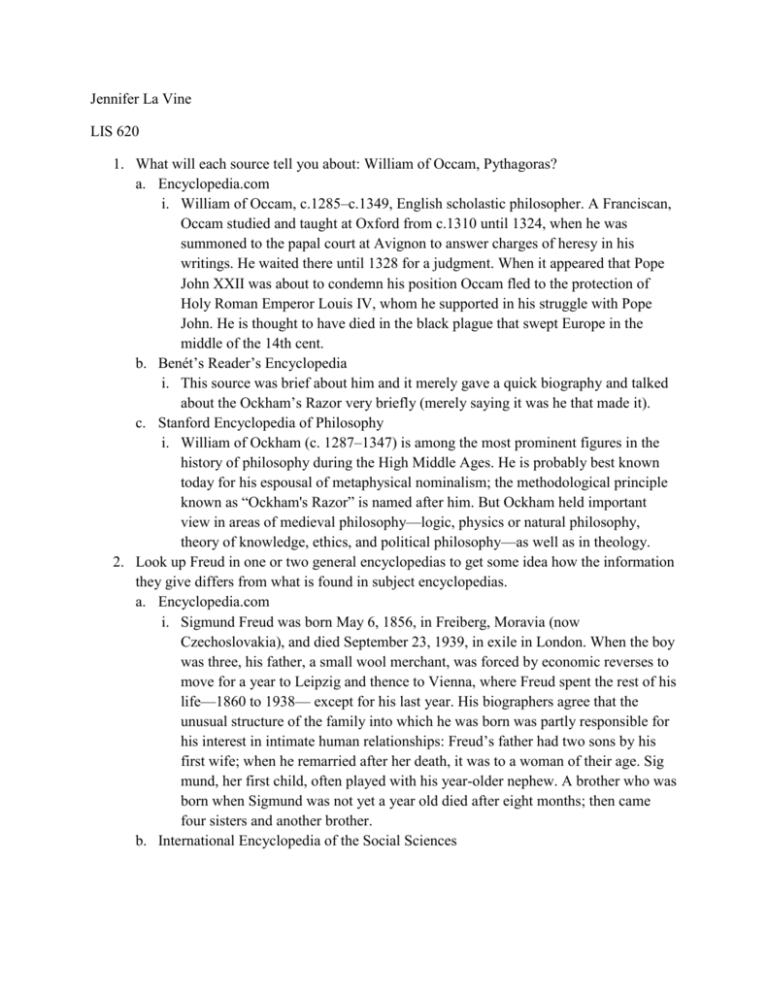
Jennifer La Vine LIS 620 1. What will each source tell you about: William of Occam, Pythagoras? a. Encyclopedia.com i. William of Occam, c.1285–c.1349, English scholastic philosopher. A Franciscan, Occam studied and taught at Oxford from c.1310 until 1324, when he was summoned to the papal court at Avignon to answer charges of heresy in his writings. He waited there until 1328 for a judgment. When it appeared that Pope John XXII was about to condemn his position Occam fled to the protection of Holy Roman Emperor Louis IV, whom he supported in his struggle with Pope John. He is thought to have died in the black plague that swept Europe in the middle of the 14th cent. b. Benét’s Reader’s Encyclopedia i. This source was brief about him and it merely gave a quick biography and talked about the Ockham’s Razor very briefly (merely saying it was he that made it). c. Stanford Encyclopedia of Philosophy i. William of Ockham (c. 1287–1347) is among the most prominent figures in the history of philosophy during the High Middle Ages. He is probably best known today for his espousal of metaphysical nominalism; the methodological principle known as “Ockham's Razor” is named after him. But Ockham held important view in areas of medieval philosophy—logic, physics or natural philosophy, theory of knowledge, ethics, and political philosophy—as well as in theology. 2. Look up Freud in one or two general encyclopedias to get some idea how the information they give differs from what is found in subject encyclopedias. a. Encyclopedia.com i. Sigmund Freud was born May 6, 1856, in Freiberg, Moravia (now Czechoslovakia), and died September 23, 1939, in exile in London. When the boy was three, his father, a small wool merchant, was forced by economic reverses to move for a year to Leipzig and thence to Vienna, where Freud spent the rest of his life—1860 to 1938— except for his last year. His biographers agree that the unusual structure of the family into which he was born was partly responsible for his interest in intimate human relationships: Freud’s father had two sons by his first wife; when he remarried after her death, it was to a woman of their age. Sig mund, her first child, often played with his year-older nephew. A brother who was born when Sigmund was not yet a year old died after eight months; then came four sisters and another brother. b. International Encyclopedia of the Social Sciences i. This source talked about his theories into the human brain and psycho-analysis of the social being. It was not as in depth about Freud himself but more so about the psycho-analysis theory. c. McGraw-Hill Encyclopedia of Science and Technology i. I did not see him in this source. I found this surprising because I thought there would be something about the technological advances in made with psychoanalysis. d. Benét’s Reader’s Encyclopedia i. This source talks about Sigmund Freud as an Austrian psycho-analyst, regarded as the founder of the science of psycho-analysis, which grew out of his experiences in treating sufferers from hysteria and neurosis. (pg 407). 3. What sort of information does each give you on "Music"? a. Encyclopedia of Religion i. This source merely talked about the importance of music in religion. Music allows one to express their faith to the Holy Spirit. This type of music is called Hymnals b. McGraw-Hill Encyclopedia of Science and Technology i. This source talks about musical instruments. The different kinds, how they were made, and the importance of having the different musical instruments for science purposes. c. The Dictionary of Art i. This source gave the history of music and different musicians. It categorized music as an art form. d. New Grove Dictionary of Music and Musicians i. This source talks about musica, music comedy, music parties, musical during the war, music glasses, music halls, and musicology. e. Encyclopedia of Southern Culture i. This source talks about music with slavery, southern balls (coming out parties), and it talks about southern music as a whole. It also talks about the importance of music during the civil war. It talks about music keeping the slaves spirits high, and the difference between slave music and slave owner music. 4. Could I find anything on "Revisionist history" [meaning reinterpretation of the history of the whole field, sometimes with respect to previously ignored minorities] in these sources? How about "social democracy"? a. It was very difficult to find these terms in any of the encyclopedias. b. Encyclopedia.com i. Social democracy is a political ideology that officially has as its goal the establishment of democratic socialism through reformist and gradualist methods. Alternatively, social democracy is defined as a policy regime involving a universal welfare state and collective bargaining schemes within the framework of a capitalist economy. It is often used in this manner to refer to the social models and economic policies prominent in Western and Northern Europe during the latter half of the 20th century c. International Encyclopedia of the Social Sciences i. Social Democracy: principle of gradual shift to socialism: the political belief that a change from capitalism to socialism can be achieved gradually and democratically d. Benét’s Reader’s Encyclopedia i. Historical revisionism, the reinterpretation of orthodox views on evidence, motivations, and decision-making processes surrounding a historical event 5. Think of one person and one general topic that you would expect to find in at least three of the listed sources. Look them up in all pertinent sources and see what you find. a. Encyclopedia of Religion i. Luther was a German theologian whose doctrinal conflicts with the papacy led to the Protestant Reformation. His reform of medieval theological anthropology from a body-soul dichotomy toward an individuated person and conscience led to new ways of understanding, as in the following: (1) the equality of secular and sacerdotal orders and a functional understanding of ministry and secular vocation thus "the priesthood of all believers"; (2) salvation as based on the individual's faith relation to God as opposed to the medieval penitential system; (3) the role of secular order and authority in the providence of God and the individual's obedient relation to it; (4) the individual conscience before God as the basis of ethical action. b. New Grove Dictionary of Music and Musicians i. This source briefly talks about music parties and music during the slave. It also briefly talks about religious music in reference to Lutheran music. c. Encyclopedia of Southern Culture i. This source talks about slavery a lot. The topics consist of cotton production, architecture, defense, white supremacy, religion, literature, geographical boundary, historic preservation, politics, Thomas Jefferson, isolation, colonial south, taxation on owners, films and television, poverty, effect on immigration, women and slavery, escaping/runaway slaves, marriage, civil war, tobacco, and interracial relationships. d. Benét’s Reader’s Encyclopedia i. Martin Luther is in this source is a German religious reformer. Professor of Biblical exegesis at Wittenerg. He nailed to the front door of a church his ninetyfive theses questioning the value of indulgences.
